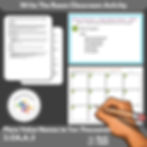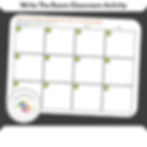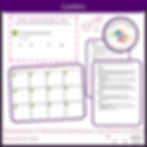Hey, fabulous educators! The school year has finally wrapped up, and summer is here. It’s time to shift gears from grading papers to soaking up some sun and seriously prioritizing self-care. Especially if you’re in special education, where you give your heart and soul daily, it's crucial to recharge your batteries. Let’s dive into some fun, practical ways to make the most of your summer break and get ready to crush it next school year.
What You Will Learn
Fabulous self-care tips and activities to help you recharge
Why self-care is a must-have, not a luxury
Strategies for maintaining your physical, mental, and social well-being
How to create a self-care plan that’s all about you
Understand the Importance of Self-Care
First things first, let’s talk about why self-care is non-negotiable. Teaching isn’t just a job; it's a passion project that demands your emotional and physical energy. Taking time for yourself ensures you can continue being the rockstar your students need. Think of it as giving your superhero cape a much-needed dry clean.
Create a Self-Care Plan
Design a self-care plan that’s tailor-made for you. This isn’t a one-size-fits-all deal; it’s about what makes you feel awesome.
Mental Health
Let’s get zen, shall we? Here are some stress-busting, soul-soothing activities:
Meditation: Even a few minutes a day can clear the mental clutter.Example: Mrs. Thompson, a special education teacher, starts her day with a 10-minute meditation session. She sits on her porch, listens to the birds, and focuses on her breath. This small practice helps her start the day calm and centered.
Yoga: Stretch it out and find your inner calm. Bonus points if you do it in cute yoga pants.Example: Mr. Rodriguez, a high school math teacher, joins a weekly yoga class at a local studio. The class helps him stretch out the tension from the school year and connect with a community of fellow yoga enthusiasts.
Therapy: Sometimes, talking it out with a professional can be the best gift you give yourself.Example: Ms. Kim, an elementary teacher, schedules bi-weekly sessions with her therapist to talk through the challenges and triumphs of the past school year. These sessions help her process her experiences and plan for the future.
Physical Activity
Get that body moving! Exercise is not just about staying fit; it's about feeling good. Find what makes you happy:
Yoga: Double mention because it’s that good.Example: Mrs. Lee, a kindergarten teacher, does a morning yoga routine at home using an online video. It’s a gentle way for her to wake up her body and mind.
Swimming: Dive into cool waters and let your worries float away.Example: Mr. Carter, a middle school science teacher, spends his afternoons at the local pool. Swimming laps not only keeps him fit but also provides a refreshing break from the summer heat.
Cycling: Hit the trails and enjoy the wind in your hair.Example: Ms. Patel, a special education teacher, enjoys weekend cycling trips with her friends. They explore new trails and enjoy the scenery while getting some great exercise.
Walking: Simple yet effective. Plus, it’s a great excuse to listen to your favorite podcast.Example: Mrs. Hernandez, a history teacher, takes daily walks in her neighborhood while listening to her favorite history podcast. It’s a relaxing way for her to learn and stay active.
Hobbies and Interests
Remember those hobbies you love but didn’t have time for? Now’s the time to dive back in:
Reading: Get lost in a book that’s not a textbook.Example: Mr. Nguyen, a high school English teacher, creates a summer reading list of novels he’s been wanting to read. He spends his afternoons in a hammock, completely engrossed in his books.
Gardening: Nurture some plants and watch them grow.Example: Ms. Lopez, an art teacher, turns her backyard into a beautiful garden. She finds joy in planting flowers and vegetables, and the physical activity is a great way to stay active.
Painting: Express your creativity with colors.Example: Mr. Anderson, a special education teacher, sets up an easel in his backyard and paints landscapes. It’s a relaxing and creative outlet for him to unwind.
Playing a Musical Instrument: Strum, drum, or tickle the ivories—whatever makes your heart sing.Example: Ms. Williams, a music teacher, revisits her love for the piano. She practices new pieces and even records a few to share with friends and family.
Connect with Others
Yes, some self-care is solo, but don’t forget the joy of connecting with others.
Socialize
Plan some fun outings with friends and family. Keep those social bonds strong:
Community Events: Join in and feel the community spirit.Example: Mr. Parker, a history teacher, attends a local food festival with his family. They enjoy trying different foods and spending quality time together.
Trips: Even a day trip can be a fantastic mini-vacation.Example: Ms. Rivera, a special education teacher, takes a weekend trip to a nearby beach with her friends. The change of scenery and relaxation by the water rejuvenates her.
Coffee Dates: Catch up with friends over your favorite brew.Example: Mrs. Evans, an elementary teacher, meets up with a fellow teacher friend for coffee every Friday morning. They chat about their summer plans and share teaching tips.
Professional Support Groups
Share your experiences and support each other in a group of fellow educators. Because who understands a teacher better than another teacher?
Example: Mr. Smith, a middle school math teacher, joins an online support group for educators. They share resources, tips, and encouragement, helping each other navigate the challenges of teaching.
Set Boundaries
Boundaries are your best friend. They help you relax and truly enjoy your time off.
Email and Work Communication: Decide if, when, and how often you’ll check work emails. Set specific times or days for any work-related tasks, if you absolutely must. Example: Mrs. Johnson, a special education teacher, sets a strict rule for herself: no work emails during the first two weeks of summer break. This allows her to fully disconnect and unwind.
Reflect and Rejuvenate
Summer is the perfect time to reflect on the past year and set some goals for the next.
Journaling: Write down your thoughts, feelings, and plans. It’s a fantastic way to clear your mind and set intentions for the future. Example: Ms. Brown, a high school science teacher, keeps a journal where she reflects on her teaching experiences and sets personal and professional goals for the upcoming year.
Self-care is your secret weapon to staying fabulous and effective. By taking the summer to recharge, you’ll be more than ready to tackle the new school year with energy and enthusiasm. So go ahead, indulge in some well-deserved ‘me time,’ and get ready to dazzle your students come fall.
Sample 60-Day Self-Care Plan for Teachers
Here's a comprehensive 60-day self-care plan to help you recharge over the summer. This plan includes activities for mental health, physical activity, hobbies and interests, social connections, and reflection. Feel free to adjust it to suit your preferences and schedule.
Day | Activity | Description |
1 | Meditation | Start your summer with a 10-minute meditation session to clear your mind and set intentions. |
2 | Yoga | Join a local yoga class or follow an online session to stretch and relax. |
3 | Read a Book | Begin reading a novel or a book you’ve been wanting to read. |
4 | Gardening | Spend time in your garden or plant some new flowers or herbs. |
5 | Swimming | Visit a local pool or beach and enjoy swimming. |
6 | Coffee with Friends | Catch up with friends over a cup of coffee. |
7 | Journaling | Reflect on the past week and write down your thoughts in a journal. |
8 | Walking | Take a 30-minute walk in a nearby park or around your neighborhood. |
9 | Painting | Spend time painting or engaging in another creative hobby. |
10 | Therapy Session | Schedule a session with a therapist or counselor to talk through any lingering stress. |
11 | Bike Ride | Go for a bike ride on a scenic trail. |
12 | Social Event | Attend a community event or social gathering. |
13 | Reflective Journaling | Write about your personal and professional growth goals for the summer. |
14 | Rest Day | Take a full day to rest and do nothing strenuous. |
15 | Meditation | Engage in a guided meditation session. |
16 | Yoga | Attend another yoga class or follow a new online session. |
17 | Reading | Continue reading your book or start a new one. |
18 | Gardening | Tend to your garden and enjoy the process of nurturing plants. |
19 | Swimming | Have another refreshing swim at the pool or beach. |
20 | Family Time | Spend quality time with family members. |
21 | Reflective Journaling | Reflect on your accomplishments and write about them. |
22 | Hiking | Go on a hike to explore nature and get some exercise. |
23 | Music | Play a musical instrument or listen to your favorite music. |
24 | Therapy Session | Check in with your therapist or counselor. |
25 | Community Service | Volunteer at a local organization or community event. |
26 | Brunch with Friends | Have brunch with friends to catch up and relax. |
27 | Reflective Journaling | Write about your feelings and experiences from the past week. |
28 | Rest Day | Take another day to rest and recharge. |
29 | Meditation | Practice a new meditation technique. |
30 | Yoga | Participate in a different yoga class or session. |
31 | Reading | Finish your book or start a new one. |
32 | Cooking | Try out a new recipe and enjoy a home-cooked meal. |
33 | Swimming | Enjoy a swim and relax by the pool or beach. |
34 | Coffee with Friends | Catch up with friends at your favorite coffee shop. |
35 | Reflective Journaling | Reflect on your mid-summer progress and write about it. |
36 | Walking | Take another 30-minute walk in nature. |
37 | Art Project | Start a new art project or continue with an ongoing one. |
38 | Therapy Session | Attend a therapy session to discuss any current thoughts or issues. |
39 | Family Picnic | Organize a picnic with family at a local park. |
40 | Movie Night | Watch a movie that you've been wanting to see. |
41 | Reflective Journaling | Journal about your favorite summer activities so far. |
42 | Rest Day | Enjoy a day of complete relaxation. |
43 | Meditation | Meditate for 10 minutes in a peaceful setting. |
44 | Yoga | Do a yoga session focused on relaxation and stretching. |
45 | Reading | Start another book or read a series of articles that interest you. |
46 | Gardening | Spend some time in your garden, focusing on new plants or projects. |
47 | Swimming | Take a swim to cool off and stay active. |
48 | Coffee with Friends | Meet friends for a coffee and share summer experiences. |
49 | Reflective Journaling | Write about your plans and goals for the last part of summer. |
50 | Cycling | Go for a bike ride and explore a new area. |
51 | Cooking Class | Take an online or in-person cooking class to learn new skills. |
52 | Therapy Session | Have a session with your therapist to review your summer progress. |
53 | Day Trip | Take a day trip to a nearby city or natural attraction. |
54 | Game Night | Organize a game night with friends or family. |
55 | Reflective Journaling | Reflect on your entire summer and write about what you’ve learned. |
56 | Rest Day | Relax and enjoy a day of doing nothing. |
57 | Meditation | Meditate and reflect on the upcoming school year. |
58 | Yoga | Do a yoga session to prepare your mind and body for the return to school. |
59 | Reading | Finish any books you’ve started and make a list of favorites. |
60 | Reflection and Planning | Spend the day reflecting on your summer and planning for the school year ahead. |
This sample plan balances physical, mental, and social activities to ensure a well-rounded approach to self-care. Adjust it as needed to fit your preferences and schedule, and enjoy a rejuvenating summer!
Explore our IEP Goal Bank, Lesson Plan Templates, and TeachTastic Store for more resources and tools to support your teaching.

































